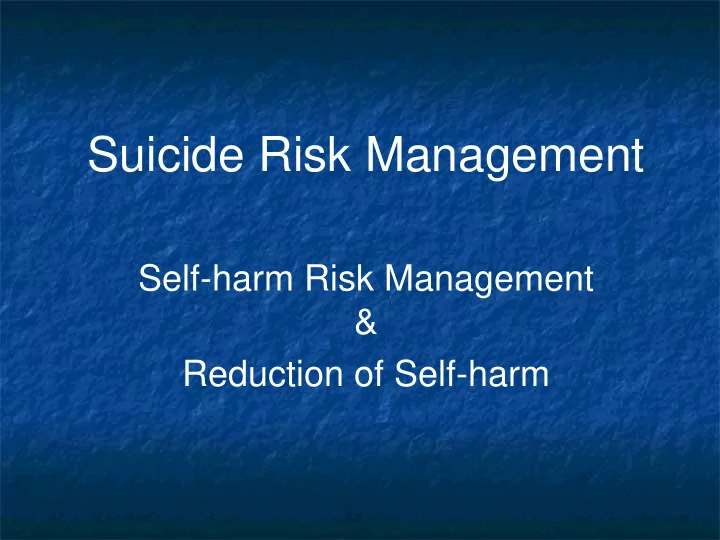

Suicide Risk Management Self-harm Risk Management & Reduction of Self-harm
Gary Bawtinhimer,MD Staff Psychiatrist Veterans Health Administration Anchorage, AK Gary.Bawtinhimer@va.gov
Disclosure
A Complement, a Thanks and a Concern Always remember you are treating not only the patient
Can Suicide be Prevented?
A Word About Words “ successful suicide? ” There is nothing successful about suicide There are completed suicides, incompleted self-harm attempts, and aborted self-harm attempts
The Epidemiology of Suicide Problems in definition, diagnosis and measurement Epidemiology of suicide (Inherently inaccurate) Cannot measure failed suicides Can chart deaths labled as suicide and follow trends
Things Are Not Always as They Appear The Uncertainty of Statistics and Scientific Evidence The inherent difficulty in recognizing suicidal intent
Intentional Suicide, Accidental Suicide, and Para-Suicidal Behaviors The Woman at the Motel Mr. Nails And the Intentional or Unlucky Driver
How to View and Manage Suicide Risks Treating Statistics vs. Managing the Behavior Contributing to the Statistics Example: Owning a Gun … the Misfire … And the Gun Lock
So What Do We Do Short of Reading Minds?
Monitor Risk - It’s Ongoing and Dynamic -
Manage Risk (Treatment/Education/Access)
The Primary Manageable Risk Factors Ideation Ambivalence Warnings Inhibitions Hope
Ideation Determining Presence of SI Expressed vs. Implied Verbalized vs. Silent Resigation Behaviorally Expressed Non-verbal warnings The anxious patient
Ambivalence You will only meet ambivalent suicidal individuals You goal: Amplify the survival side of the ambivalence
Warnings Be Aware of silent resignation Getting things in order New Insurance policies A new will Given away precious possessions Acute serenity
Inhibitions Normal biological striving to resist death Overriding inhibitions ETOH/SA (50% rule) Psychosis Dementia Passion
Hope Hope vs Desperation Suicide as an Act of Desperation A Hopeless Patient is a High Risk Patient Faith Saves Lives
What to Do: What Works/What Doesn't Your Best and Most Reliable Tool is Your Clinical Intuition Listen to it Refine It (the value of experience) Pursue What Does Not Make Sense
Some Tools & Advice Fight denial (“He wouldn’t do that”) Whenever you suspect SI...suspect HI Use shame carefully and avoid condescension Guilt…It's limited but important use (explore the patient's fantasy of what follows their death)
No Suicide Contracts Do they work?
More Tools & More Advice Examine the “Exquisite Moment” and conduct psychological autopsies The therapeutic window for prevention (its short...act fast) When in Doubt…Consult
The Treatment Approach Personalize the risk reduction tx plan. Preserve dignity Treatment (counseling>medication) counsel, medicate, both, or neither Education (patient, spouse, family, community)
Specific Assessment Techniques How to Ask About Suicidal Ideation "Sometimes when people feel depressed and discouraged as you do, they wonder if life is worth living. Does that ever happen to you?"
How to Ask About Homicidal Thoughts “Feeling depressed and suicidal sometimes makes people have unpleasant thoughts like taking the lives of others even loved ones. Has that ever happened to you?”
How to Approach Discussion of the "Exquisite Moment" "Its hard to talk about the difficult time when you were about to take your life. But what we can learn from that is so important. Tell me what you were thinking when you had the gun to your head, but decided at the last moment to live?"
How to Advise Getting Rid of the Guns Acknowledge competence, but share the statistics "We want to put things in your favor for getting well and being safe. We know that when people are depressed and have ready access to guns they are at a much higher risk of injury or death.”
More “Do’s” Assess the health of the support network (Getting passion to work for , not against, the patient) Encourage and reward sobriety and abstinence from mind altering illicit drugs (including THC) Encourage compliance with MH rxs Encourage removal of weapons Listen for future oriented comments ( perhaps the best prognostic indicator) Therapeutic availability is crucial (but what does that entail?)
And Then …... Reward yourself, recharge your batteries. You will be able to do better work for your patients Do not blame yourself for a bad outcome. It cannot be determined…it serves no purpose Be grateful knowing that you are making an important difference…you are.
Recommend
More recommend